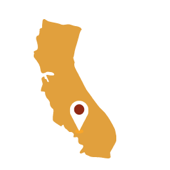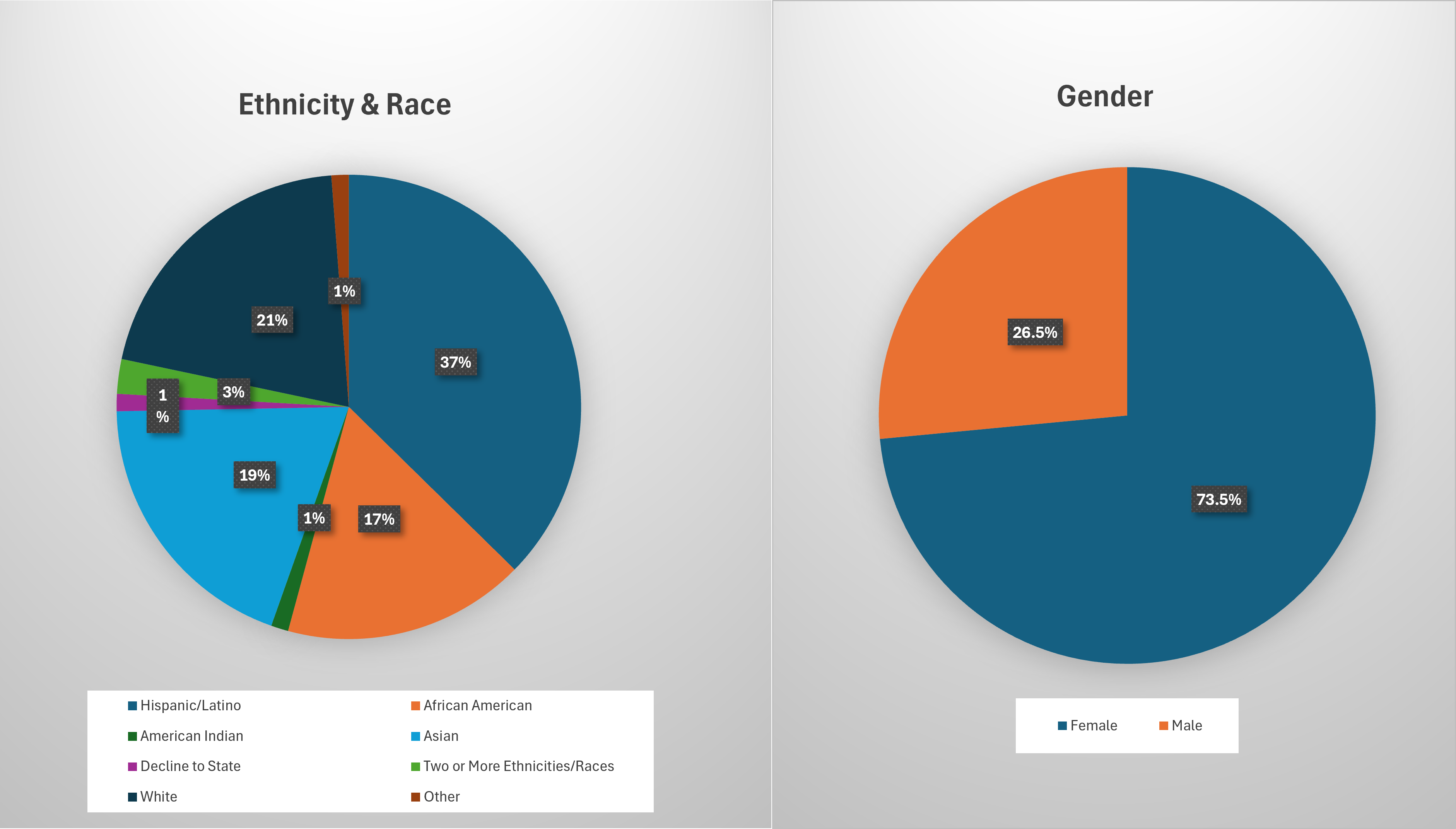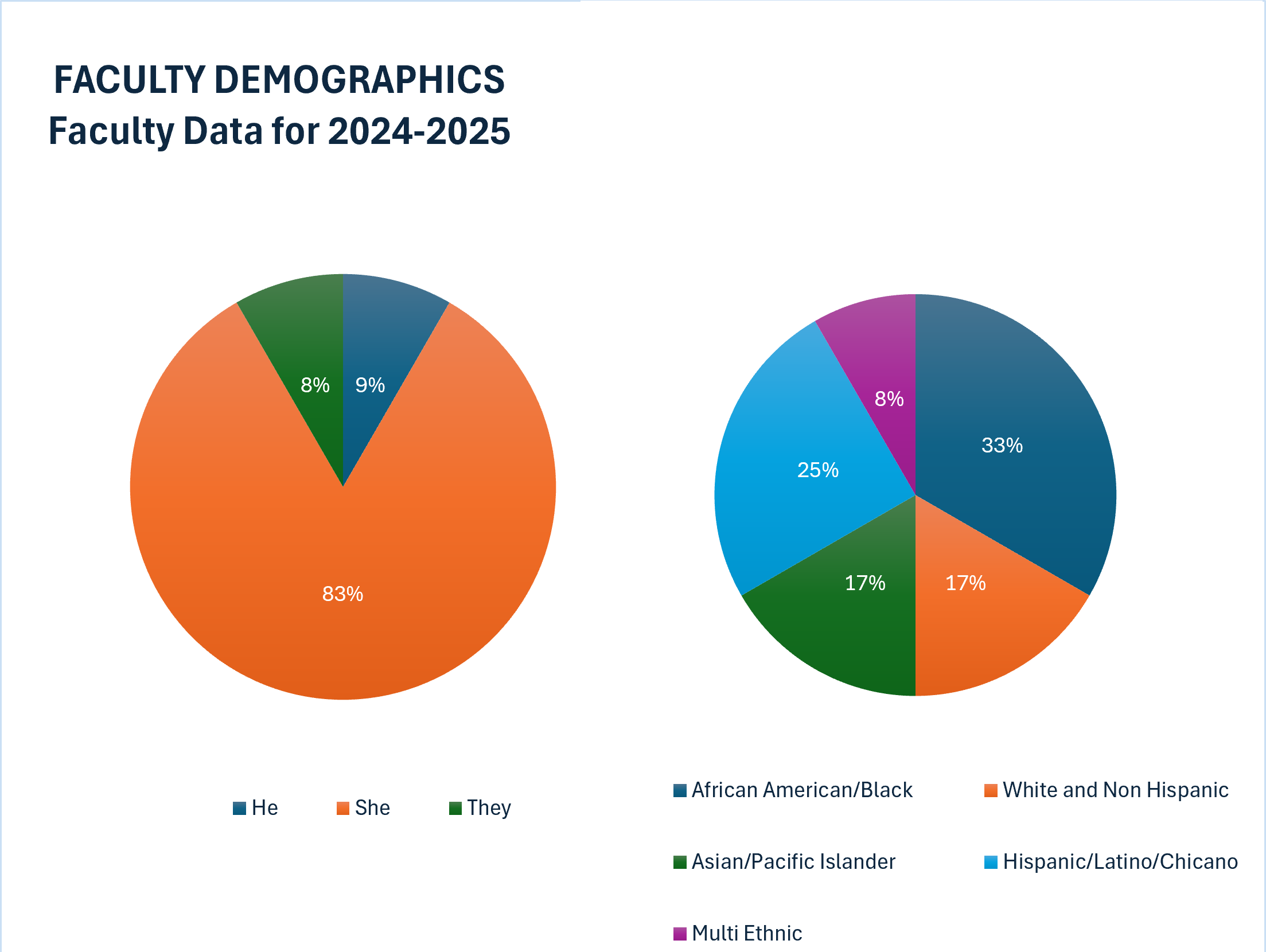
The Master of Science in Marital and Family Therapy is a 64-credit degree designed to graduate licensable MFTs (Marriage and Family Therapists) equipped to guide clients toward healing and relational restoration. Informed by systemic orientation, social justice, and evidenced-based practices, our mission is to integrate the science and practice of couple and family therapy, and to equip students with a solid foundation to promote the biopsychosocial, spiritual, and relational well-being of individuals, couples, and families in diverse communities. Furthermore, students will undergo personal development guided by self-of-the-therapist work. The 3-year degree program aims to provide students with the academic, clinical, and professional training, along with 300 client contact hours of applied, supervised clinical practicum, necessary to function as skillful mental health professionals in their local and global communities.
The MFT program is accredited by Western Association of Senior College and University Commission (WSCUC) and meets the educational requirements for MFT licensure with the California Board of Behavioral Sciences (BBS), according to California Business and Professions Code (BPC) §4980.36. The MFT curriculum aligns with the educational and clinical COAMFTE Standards. The Department permits enrollment in courses solely to students admitted to the M.S. in Marital and Family Therapy program.

Courses are offered primarily in the evening to accommodate students who work during the day. Students must expand their availability in year two to accommodate traineeship and the Program’s practicum course.

Cohort Program designed to bring MFT students together with shared goals and skills to learn and progress through the program.

6 4 -unit program full-time allows students to complete the program requirements in three years. The option for a part-time plan of study is only available with advisement and approval from the Department’s program director and chair.
![]()
Welcomes and trains students to work with diverse, marginalized communities in inclusive and equitable practices. The program is committed to diversity as reflected in its mission, students, faculty, and community engagement.

Publicly supported program in Southern California offering curriculum and clinical training that meets the educational requirements set by the California Board of Behavioral Sciences required to become a registered Associated Marriage and Family Therapist.
Career PossibilitiesAccording to the Bureau of Labor Statistics on Marriage and Family Therapists, the employment outlook grows 15% faster than the average for all occupations. A marriage and family therapist can gain employment in the public and private sectors. Career possibilities include the following settings: Outpatient care centers, inpatient care facilities and hospitals, Employee Assistance Programs, schools, social services agencies, substance abuse agencies, and private practice.
* Pre-Admission Disclosure for Academic Programs Leading to Licensure or CredentialingAdmission into programs leading to licensure does not guarantee that students will obtain a license. Licensure requirements are set by agencies not controlled by or affiliated with the CSU (California State University) and can change at any time. For example, licensure requirements can include evidence of the right to work in the United States (e.g., social security number or taxpayer identification number) or successfully passing a criminal background check. Students are responsible for determining whether they can meet licensure requirements. The CSU will not refund tuition, fees, or associated costs to students who determine after admission that they cannot meet licensure requirements. Information concerning licensure requirements is available at the https://www.bbs.ca.gov/.
The Board of Behavioral Science (BBS) evaluated and determined that the Master of Science degree obtained from the CSUDH (California State University, Dominguez Hills) MFT program meets state requirements to pursue licensure for marriage and family therapy (MFT) in California. However, it is essential to note that each state regulates the licensure of MFT. Licensure in California does not denote licensure in other states, provinces, or U.S. territory. The MFT Department advises students to be aware of the limits of portability. As licensure requirements vary from state to state, students interested in pursuing licensure in a state other than California must consider the state licensure requirements. The department policy on informing students about limits of licensure acquires before students enroll in the program. The department explains and requires acknowledgment of the limitations of licensure across state-lines in the applicant's Cal State Apply application to the program and during New Student Orientation (NSO) before students enroll in any classes. The MFT department requires all prospective students, before enrolling in Semester one (1) courses, to sign and submit the ACKNOWLEDGEMENT OF INFORMATION POTENTIAL VARIANCES IN LICENSES REGULATION ACROSS STATES AND PROVINCES included in the Appendix of the MFT Handbook.
Additional information concerning variations and limits in licensing regulations across states, provinces, or U.S. territories is available from the MFT Department: mftdept@csudh.edu
We prepare students in systemic theory, research, and relational practice to critically and ethically engage concerns of intersectionality, equity, and social justice to improve systems of oppression and promote wellness among individuals, couples, and families of diverse and underserved communities.
The mission of the MFT Program is linked to the university’s mission and guides the program goals, program outcomes, and student learning outcomes which inform course content and assessments.
Program Goals (PG)The MFT program goals reflect the COAMFTE’s five Developmental Competency Components outlined in Standards Version 12.5.
Students graduating from the CSUDH MFT program achieve competency in couples, marriage, and family therapy, evidenced by a collection of distinct program learning outcomes.
PLO 1: Knowledge/Research - Apply foundational and relational knowledge from a wide range of family and systemic theories and treatment techniques informed by research.
PLO 2: Diversity - Demonstrate awareness of intersectional identities and contextual influences within diverse communities, social systems, and marginalized groups in clinical practice.
PLO 3: Ethics - Apply legal, ethical, and professional standards required for clinical, systemic, and relational practice.
PLO 4: Practice - Demonstrate competence in systems/relational practice according to MFT professional standards, as reflected in implementing, articulating, and writing up on clinical cases.
Student Learning Outcomes (SLO)SLO 1: Knowledge - Students demonstrate working knowledge of traditional, contemporary, and evidenced-based MFT theories to clinical case conceptualization and treatment planning that are informed by research.
SLO 2: Diversity - Students demonstrate how intersectional identities influence family functioningSLO 3: Diversity - Students self-reflect on the implications of own and others’ social location in clinical practice.
SLO 4: Ethics - Students apply ethical standards, consistent with the current California MFT statutes and regulations, and the American Association of Marriage and Family Therapy Code of Ethics, in diverse clinical contexts.
SLO 5: Practice - Students implement appropriate and accurate clinical competencies and skills (e.g., biopsychosocial assessment, diagnosis, treatment planning and implementation) from a systemic/relational perspective.
Diversity StatementMFT Department’s Diversity Statement
The Marital and Family Therapy Department welcomes and encourages ks in inclusive and equitable practices to work with diverse, marginalized communities. The program values and is committed to diversity as reflected in its mission, students, faculty, supervisors, and community engagement. It recognizes that diversity as being inclusive but not limited to race, age, gender, ethnicity, sexual orientation, relationship status, gender identity, socioeconomic status, disability, health status, religious or spiritual beliefs, religious or spiritual affiliation, national origin, and veteran status. The MFT program aligns with the university and global CSU system. The program does not discriminate based on any of the diversity mentioned statues indicated above in its activities, programming, education, or training relating to students, faculty, supervisors, or professional program staff. We maintain that diversity allows for a robust and productive learning environment for faculty and students and provides the experiences needed to serve diverse communities better through socially just practices. The program readily embodies diversity and records and publishes materials regarding the diversity composition of its students, faculty, and supervisors unless prohibited by law. The program's diversity statement is informed by and follows the mission statements throughout the CSUDH system.
Program Diversity Report

CSUDH Graduate Achievement Data
Advertised Program Length: 3 Years
Maximum Program Length: 5 Years
| *Cohort Term/Year Students Entered Program | # of Students in Program | Advertised Graduation Rate (%) * | Job Placement Rate (%) ** | BBS Exam Pass Rate (%) *** |
|---|---|---|---|---|
| Fall 2016 | 16 | 81% | 83% | 66% |
| Spring 2017 | 13 | 69% | 69& | 100% |
| Fall 2017 | 24 | 79% | 75% | In progress |
| Spring 2018 | 9 | 88% | 88% | In progress |
| Fall 2018 | 30 | 80% | 76% | In progress |
| Spring 2019 | 14 | 92% | 92% | In progress |
| Fall 2019 | 12 | 83% | 83% | In progress |
| Spring 2020 | 10 | 100% | 80% | In progress |
| †Fall 2020 | 19 | 84% | 47% | In progress |
| †Spring 2021 | 14 | 56%(8) | In progress | In progress |
| Fall 2021 | 21 | 91%(19) | In progress | In progress |
| Fall 2022 | 18 | In progress | In progress | In progress |
| Fall 2023 | 27 | In progress | In progress | In progress |
| Fall 2024 | 35 | In progress | In progress | In progress |
*Advertised Graduation Rate: The percentage of students based on the cohort term/year entered who graduated from the MFT Program within three (3) years (advertised length of completion).
**Job Placement Rate: The percentage of graduates based on the cohort term/year entered who reported employment within three (3) years of graduation, utilizing skills learned in the MFT Program.
***CA Law and Ethics Exam Pass Rate: The percentage of graduates based on the cohort term/year entered who passed the California Law and Ethics Exam. The BBS first administered the Law and Ethics Exam in January 2016; Associates must take the exam within the first year of registration as an Associate Marriage and Family Therapist.